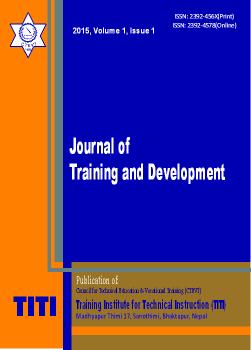Agriculture Education for Rural Development in Nepal
DOI:
https://doi.org/10.3126/jtd.v1i0.13089Keywords:
Agriculture education, agricultural development, rural developmentAbstract
This paper appraises the possible importance of accessible agriculture education program in agriculture and rural development sectors. Rural development is a strategy for reducing poverty and uplift socio-economic infrastructures in rural areas especially through agriculture development which is almost impossible without proper management of agriculture graduates and trained farmers. An attempt is also made to examine the transformative role of responsible public and private mechanism, skilled farmers and agriculture graduates for achieving ultimate goals and objectives of agricultural policies and rural development efforts during various plan periods. However, still most of agriculture graduates have to be encouraged to working with farmers and need to be devoted in agricultural based occupations. Nepalese economy has undergone a gradual structural shift in the recent years and there is 4.03% average GDP contribution by agriculture sector. Still 2.5 million people need immediate assistance because of insufficient land and production and 4.4 million people are trapping in food insecurity because of raising price in food grains. But Nepal ranked as the sixth largest producer of lentils and the third largest producers of ginger. Cardamom, lentils, tea and ginger are also the leading agricultural export items. This situation suggests that the country is still potential destination form the perspectives commercial farming and agricultural transformation, if the government gives excessive emphasize to providing accessible and affordable agriculture education opportunities to socio-economically backward students whose family members are still working in agriculture sectors. This paper emphasizes that formulating agriculture and rural development policies are not proper way to solve socio-economic problems but it is inevitable to diffuse agriculture education program in rural areas for producing skilled and knowledgeable workforce. The government needs to expand agricultural service delivery mechanism and mobilize agriculture graduates in remote areas and private sectors also need to invest in agriculture sectors as for struggling against food insecurity.
DOI: http://dx.doi.org/10.3126/jtd.v1i0.13089
Journal of Training and Development Vol.1 2015: 38-45
Downloads
Downloads
Published
How to Cite
Issue
Section
License
Authors who publish with this journal agree to the following terms:
- Authors retain copyright and grant the journal right of first publication with the work simultaneously licensed under a Creative Commons Attribution License that allows others to share the work with an acknowledgement of the work's authorship and initial publication in this journal.
- Authors are able to enter into separate, additional contractual arrangements for the non-exclusive distribution of the journal's published version of the work (e.g., post it to an institutional repository or publish it in a book), with an acknowledgement of its initial publication in this journal.
- Authors are permitted and encouraged to post their work online (e.g., in institutional repositories or on their website) prior to and during the submission process, as it can lead to productive exchanges, as well as earlier and greater citation of published work (See The Effect of Open Access).




